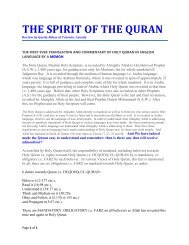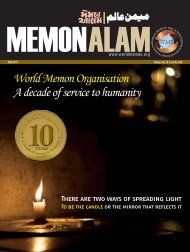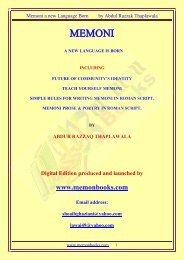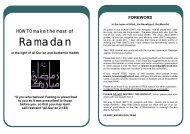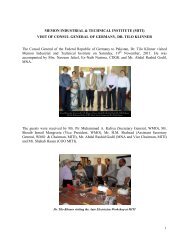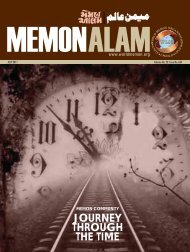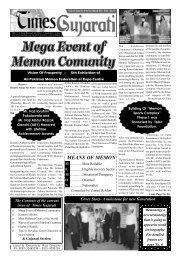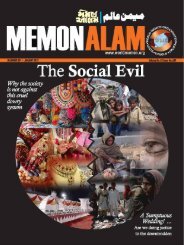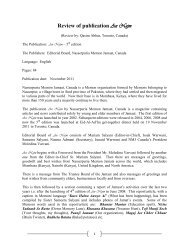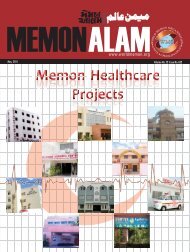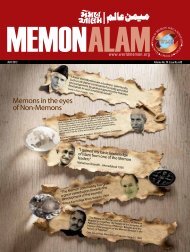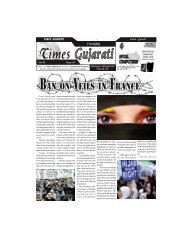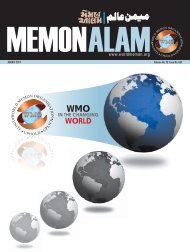February 2012.indd - World Memon Organization Pakistan Chapter
February 2012.indd - World Memon Organization Pakistan Chapter
February 2012.indd - World Memon Organization Pakistan Chapter
- No tags were found...
You also want an ePaper? Increase the reach of your titles
YUMPU automatically turns print PDFs into web optimized ePapers that Google loves.
IMMORTAL PERSONALITIESlating but very difficult to follow was thatthough his properties in India were takenover by the Indian Government, underevacuee laws it served a notice upon himfor income tax dues of Rs. 5 million. Thisremarkable man, true to his <strong>Memon</strong> spirit,arranged to pay this amount to the IndianGovernment.Mr. Dada was really one of the great<strong>Memon</strong>s.HASSAN ALI EFFENDIEnglish language was considered a satanicdialect and the Muslims were not readyto learn that language with the resultthat earlier Persian and later on Sindhi,became the official languages of the Provinceof Sindh. Taking advantage of this,the Hindus started learning English Language,and having been previously adaptat Sindhi, Persian, and Arabic languages,they monopolized government jobs atleast at the top and middle levels. Thelate Mr. Hassan Ali Effendi, born on 14thAugust 1830, in an Akhund <strong>Memon</strong> familyof Hyderabad, was a scholar of Qur’anand Persian language. He also learnedEnglish to become a clerk in the DeputyCollector’s Office at Naushehro Feroz.Here he came in touch with a ChristianColleague from whom he learned advancedEnglish. He came in contact withthe then Chief Justice, Mr. Justice Middleton,at Sindh Chief Court, on whomhe left a good and favorable impression.The justice later appointed Mr. EffendiSerishtedar. Here he got an opportunity tostudy and learn legal process and was ableto get a Sanad (Certificate) to officiate asa lawyer. Soon, his brilliant exposition oflegal acumen enabled him to be appointedPublic Prosecutor, the first local person tobe appointed to this post. Before him onlyEnglishmen were appointed to this post.Having established himself in his profession,he diverted his attention towards socialwelfare services to Muslims. For thispurpose he established Anjuman-e-Islam,Karachi, and became its President. Theobject of the Anjuman was to protect therights of Muslims and to spread educationamongst them. Later on, Mr. Effendimet Sir Syed Ahmad Khan and discussedwith him the desperate situation of SindhiMuslims and disclosed his plans to set upa high school in Karachi. Sir Syed encouragedhim by advising him to upgrade theschool to college and university level. LikeSir Syed, Effendi also had to face hostilityfrom orthodox Muslim scholars and theirfollowers. To counter the resistance oforthodox Muslims, he started publishinga magazine “Muwan-e-Majlis-e-Muhammadi”.Another hurdle was shortage offunds. For collection of funds, delegationswere sent to Muslim Nawabs andrulers of different States. The Nizam ofHyderabad donated Rs. 4000, the Nawabof Junagadh Rs.10,000 and also offeredfacilities of teaching Muslims from Sindhat Bahauddin College, Junagadh, free ofcost. After great efforts, a few rooms wereconstructed on the site with a very smallnumber of students attending the Englishclasses. After a few years, some land wasacquired from the Municipality on whicha spacious building was constructed in1890 for Sindh Madrassatul Islam, whichstill exists. Thus, after suffering immensehumiliation, anguish, hardship, abusesand resistance, Mr. Effendi achieved hisobjectives in establishing this educationalinstitution in Sindh. His role and struggleis historic. The Turkish Caliph conferredthe title Effendi on him.The two sons of Mr. Effendi, Wali Muhammadand Ali Muhammad, who were inthe government service, gave him full supportand Wali Mohammad gave up governmentservice to become the first Principal ofthe Sindh Madrassatul Islam, even thoughits future was uncertain.Several renowned figures of the Muslimcommunity acquired their education in thishistorical institution including Mr. MuhammadAli Jinnah, Father of the Nation, Mr.Abdullah Haroon, Sir Shahnawaz Bhutto,Allama I.I. Kazi. The Madrassa had Britishas well as Muslim Principals like Dr. OmarBin Daudpota, Wali Muhammad HassanAli and others.HUSEIN EBRAHIMJAMALElder brother of Latif Ebrahim Jamal,he always felt a pinch due to his incompleteeducation and for that reason hetook keen interest in educational activitiesthroughout his life. In 1928, he wentto Africa at the age of 14 and joined hisuncle’s business. He started businessdealings in cashew nuts. He returned toBombay where he made rapid progressin business and in a very short span oftime he acquired the status of one of theleading exporters and importers. He alsoentered business of jute bags. He becamevery close to Sir Adamjee Dawood. Hestarted large scale business of cashewnuts and was later termed as the king ofcashew nuts in India. At that time he wasonly 30 years old. He earned fame andcredit in public life. His social activitieswere spread in Bombay, Baroda, Okhaand Calcutta. He was a member of theprovincial Muslim League WorkingCommittee in Bombay, a member of theManaging Committee of <strong>Memon</strong> Chamberof Commerce, Bombay. The Governorof Bombay made him justice of Peace inrecognition of his extraordinary services.He took keen interest in All <strong>Pakistan</strong><strong>Memon</strong> Educational and Welfare Society,Dwarka Boarding House and BarodaBoarding House. He extended financialaid to many institutions including religiousinstitutions.During the influx of refugees fromOkha Port to Karachi, his services anddonations were notable. He migrated to<strong>Pakistan</strong> and started his relief activitieswith the establishment of <strong>Memon</strong> ReliefCommittee for providing assistance to therefugees reaching Khokhrapar and otherpoints from India. He started schools inNawabad and Khadda with large donations.He played active part in the establishmentof All <strong>Pakistan</strong> <strong>Memon</strong> Federation.During his life time he desired todonate an amount of Rs. 5 million to starta polytechnic for which a lot of spadework was done but the same amountperhaps was diverted, after his death,for financing HEJ Research Institute ofChemistry at the University of Karachi.He was a kind-hearted gentleman of uprightcharacter. His family members in hismemory established a foundation, namedHussain Foundation. In all rehabilitationand welfare services he donated generously.To mark his generous donations aportion of <strong>Memon</strong> Colony in Federal ‘B’Area is named as Hussainabad. He servedas President of All <strong>Pakistan</strong> <strong>Memon</strong> Educationaland Welfare Society. He died inLondon in 1972.MEMON ALAM FEBRUARY 2012 13



